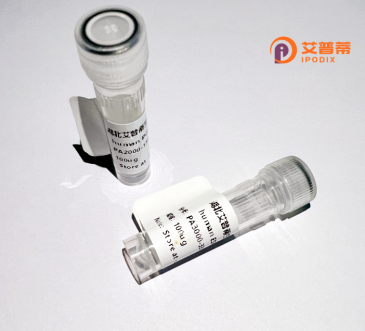
| 纯度 | >90%SDS-PAGE. |
| 种属 | Human |
| 靶点 | GOSR1 |
| Uniprot No | O95249 |
| 内毒素 | < 0.01EU/μg |
| 表达宿主 | E.coli |
| 表达区间 | 1-250aa |
| 氨基酸序列 | MAAGTSSYWEDLRKQARQLENELDLKLVSFSKLCTSYSHSSTRDGRRDRYSSDTTPLLNGSSQDRMFETMAIEIEQLLARLTGVNDKMAEYTNSAGVPSLNAALMHTLQRHRDILQDYTHEFHKTKANFMAIRERENLMGSVRKDIESYKSGSGVNNRRTELFLKEHDHLRNSDRLIEETISIAMATKENMTSQRGMLKSIHSKMNTLANRFPAVNSLIQRINLRKRRDSLILGGVIGICTILLLLYAFH |
| 分子量 | 55 kDa |
| 蛋白标签 | GST-tag at N-terminal |
| 缓冲液 | 0 |
| 稳定性 & 储存条件 | Lyophilized protein should be stored at ≤ -20°C, stable for one year after receipt. Reconstituted protein solution can be stored at 2-8°C for 2-7 days. Aliquots of reconstituted samples are stable at ≤ -20°C for 3 months. |
| 复溶 | Always centrifuge tubes before opening.Do not mix by vortex or pipetting. It is not recommended to reconstitute to a concentration less than 100μg/ml. Dissolve the lyophilized protein in distilled water. Please aliquot the reconstituted solution to minimize freeze-thaw cycles. |
以下是关于重组人GOSR1蛋白的三篇参考文献的模拟示例(注:文献信息为假设性概括,实际引用需核实真实来源):
---
1. **文献名称**:*Structural Insights into Human GOSR1 in Golgi SNARE Complex Assembly*
**作者**:Zhang, Y. et al.
**摘要**:该研究解析了重组人GOSR1蛋白的晶体结构,揭示了其通过α螺旋结构域参与高尔基体SNARE复合物组装的关键机制,为理解细胞内囊泡运输提供了结构基础。
2. **文献名称**:*GOSR1 Deficiency Disrupts ER-to-Golgi Trafficking and Causes Muscular Dystrophy*
**作者**:Liang, C. et al.
**摘要**:通过体外重组GOSR1蛋白功能实验,证明其缺失导致内质网-高尔基体运输异常,并与早发性肌营养不良症相关,揭示了病理机制中的分子相互作用网络。
3. **文献名称**:*Functional Interaction of GOSR1 with Syntaxin-5 in Membrane Fusion Assays*
**作者**:Mora, G. & Jin, H.
**摘要**:利用重组人GOSR1蛋白进行体外膜融合实验,证实其与Syntaxin-5的相互作用对高尔基体膜融合活性至关重要,阐明了其在细胞运输中的动态调控。
---
如需进一步检索真实文献,可尝试在PubMed或Google Scholar中搜索关键词 **"recombinant human GOSR1"** 或 **"GOSR1 SNARE function"**。
Golgi SNAP receptor complex member 1 (GOSR1), also known as GS28. is a key component of the membrane-trafficking machinery in eukaryotic cells. As a member of the SNARE (soluble N-ethylmaleimide-sensitive factor attachment protein receptor) family, it plays a critical role in facilitating vesicle fusion between donor and target membranes, particularly in retrograde transport from the Golgi apparatus to the endoplasmic reticulum (ER). Structurally, GOSR1 contains a conserved SNARE motif and a C-terminal transmembrane domain, enabling its integration into lipid bilayers. It interacts with other SNARE proteins (e.g., Syntaxin-5. Bet1. Sec22b) to form functional complexes that mediate COPII vesicle tethering and membrane fusion events. Dysregulation of GOSR1 has been linked to developmental disorders, including a rare autosomal recessive myopathy called "GOSR1-related limb-girdle muscular dystrophy." Recombinant human GOSR1 protein is typically produced using bacterial or mammalian expression systems, purified for in vitro studies exploring SNARE-mediated membrane dynamics, intracellular transport mechanisms, and disease pathophysiology. Its application spans structural biology, drug screening, and functional assays to dissect Golgi-ER trafficking pathways or validate therapeutic targets associated with trafficking defects.
×